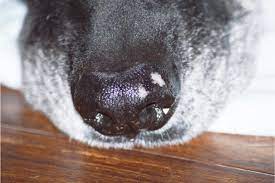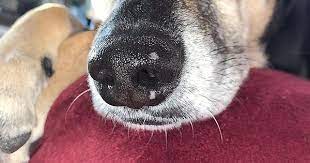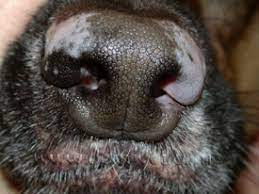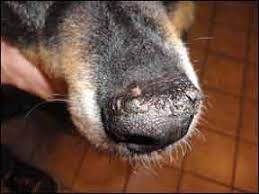White Spots On Dog Nose


Have you noticed white spots on your dog’s nose and wondered what they could be? While a dog’s nose is typically moist and pigmented, the presence of white spots can raise concerns for dog owners. In this article, we will explore the causes of white spots on a dog’s nose, common medical conditions associated with them, and how to diagnose and treat the underlying issues. Let’s delve into this topic to gain a better understanding of what might be affecting your furry friend.
Introduction
A dog’s nose is not only adorable but also serves various essential functions. It helps them explore their environment, detect scents, and communicate with other dogs. Therefore, any changes in their nose’s appearance, such as white spots, should be taken seriously. While white spots on a dog’s nose can be harmless, they can also indicate an underlying health issue. Let’s explore the possible causes in more detail.
Causes of White Spots on Dog Nose


There are several potential causes for the appearance of white spots on a dog’s nose. These can include medical conditions, allergies, infections, nutritional deficiencies, genetic factors, and even sunburn. Understanding these causes can help you identify the underlying issue affecting your dog’s nose.
Common Medical Conditions causing white spots on dog nose
Some medical conditions can contribute to the formation of white spots on a dog’s nose. Vitiligo, an autoimmune condition that affects pigment-producing cells, can cause depigmentation of the nose. Similarly, hypopigmentation, which occurs due to a decrease in melanin production, can result in white spots. It’s essential to consult a veterinarian to diagnose these conditions accurately.
Allergies and Skin Issues
Allergies and skin issues can also lead to white spots on a dog’s nose. Contact allergies, atopic dermatitis, or other skin conditions can cause depigmentation or discoloration of the nose. Identifying and addressing the allergen or skin issue can help prevent further damage to the nose.
Infections and Fungal Diseases
Infections and fungal diseases can manifest as white spots on a dog’s nose. Fungal infections, such as ringworm, can lead to depigmentation or scaly patches. Bacterial infections might also contribute to nose discoloration. Proper diagnosis and treatment by a veterinarian are crucial for resolving these issues.
Nutritional Deficiencies causing white spots on dog nose
Inadequate nutrition can result in various health problems, including white spots on a dog’s nose. Nutritional deficiencies, particularly in vitamins and minerals, can affect the pigmentation of the nose. Ensuring your dog’s diet is balanced and complete can help prevent such deficiencies.
Genetic Factors behind white spots on your dog nose
Certain genetic factors can contribute to white spots on a dog’s nose. Some dog breeds are more prone to depigmentation or pigmentation irregularities. If your dog belongs to such a breed, it’s important to be aware of potential issues and monitor their nose regularly.
Sunburn and Pigment Loss
Just like humans, dogs can also experience sunburn. Prolonged exposure to the sun without protection can lead to sunburned skin and pigment loss on the nose. It’s important to provide sun protection for your dog, especially if they have a light-colored or pink nose. Applying pet-safe sunscreen and limiting their sun exposure during peak hours can help prevent sunburn and minimize pigment loss.
Diagnosis and Treatment of the white spots on your dog nose


If you notice white spots on your dog’s nose, it’s crucial to consult a veterinarian for a proper diagnosis. The vet will conduct a thorough examination of your dog’s nose and may perform additional diagnostic tests to determine the underlying cause. These tests may include skin scrapings, blood work, or biopsies to rule out specific medical conditions or infections.
Once the cause of the white spots is identified, the veterinarian will recommend an appropriate treatment plan. The treatment will vary depending on the underlying condition. In some cases, the white spots may be irreversible, but managing the condition and preventing further damage will be the primary focus.
Preventing and Managing White Spots on dog nose
While some causes of white spots on a dog’s nose may be difficult to prevent, there are measures you can take to minimize their occurrence and manage existing spots. Here are some tips:
- Sun Protection: Protect your dog’s nose from excessive sun exposure by using pet-safe sunscreen specifically formulated for dogs. Limit their time outdoors during peak sun hours.
- Proper Nutrition: Ensure your dog’s diet is balanced and provides all the necessary nutrients. Consult with a veterinarian to determine the appropriate food and supplements for your dog’s specific needs.
- Allergen Management: If your dog has allergies or skin issues, work with your veterinarian to identify and manage the allergen. This may involve changes in diet, environment, or the use of medication or topical treatments.
- Regular Veterinary Check-ups: Schedule regular check-ups with your veterinarian to monitor your dog’s overall health and address any concerns promptly.
- Avoid Harmful Substances: Keep your dog away from chemicals, irritants, or toxins that may cause skin irritation or discoloration of the nose.
By implementing these preventive measures and addressing any underlying conditions, you can help maintain your dog’s nose health and minimize the occurrence of white spots.
See also: Will my border collie pink nose turn black
Conclusion
White spots on a dog’s nose can be a cause for concern, but they can also be indicative of various underlying conditions. Understanding the potential causes, seeking veterinary guidance, and taking preventive measures can help maintain your dog’s nose health. Remember, early detection and proper management are key to ensuring your furry friend’s well-being.
FAQs about white spots on dog nose


Can white spots on a dog’s nose be a sign of a serious medical condition?
While white spots on a dog’s nose can be harmless, they can also indicate an underlying medical condition. It’s essential to consult a veterinarian for a proper diagnosis and appropriate treatment.
Can I use human sunscreen on my dog’s nose?
No, human sunscreen can be toxic to dogs if ingested. It’s important to use pet-safe sunscreen specifically formulated for dogs to protect their nose from sunburn.
Are certain dog breeds more prone to white spots on their noses?
Yes, certain dog breeds are more prone to depigmentation or pigment irregularities. Breeds with light-colored or pink noses are more susceptible. Consult with your veterinarian to understand any breed-specific concerns.
Can I reverse the white spots on my dog’s nose?
The ability to reverse white spots depends on the underlying cause. In some cases, the spots may be irreversible, but managing the condition and preventing further damage is crucial.
Are white spots on a dog’s nose painful for them?
Generally, white spots on a dog’s nose are not painful. However, if they are accompanied by redness, swelling, or discomfort, it’s important to consult a veterinarian. They can assess the situation and provide appropriate treatment if necessary.
In conclusion, white spots on a dog’s nose can have various causes, including medical conditions, allergies, infections, nutritional deficiencies, genetic factors, and sunburn. It’s essential to pay attention to any changes in your dog’s nose and consult a veterinarian for a proper diagnosis. By identifying and addressing the underlying cause, you can ensure your furry friend’s nose health and overall well-being. Remember to take preventive measures, such as sun protection and proper nutrition, to minimize the occurrence of white spots. Regular veterinary check-ups and prompt treatment are key to maintaining your dog’s nose health and providing them with a happy and healthy life.




